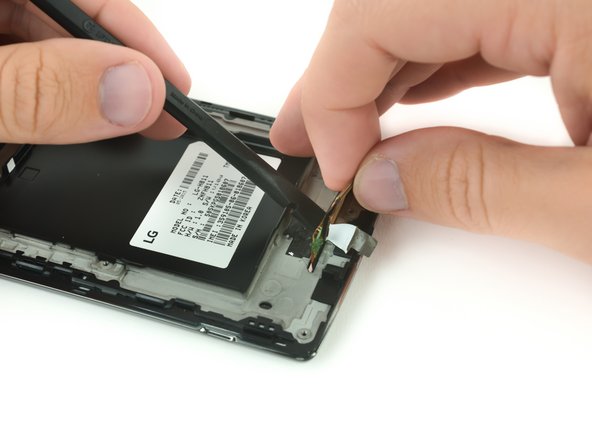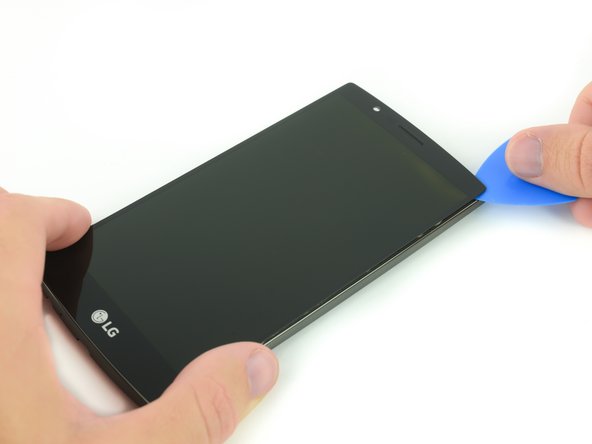Esta versión puede contener ediciones incorrectas. Cambie a la última instantánea verificada.
Qué necesitas
-
Este paso está sin traducir. Ayuda a traducirlo
-
Remove the rear cover by placing the plastic opening tool in the groove on the bottom left side of the LG G4 and gently prying up.
-
-
Este paso está sin traducir. Ayuda a traducirlo
-
Place the plastic opening tool at the bottom edge of the battery and lift up. Carefully remove battery with your hands.
-
-
Este paso está sin traducir. Ayuda a traducirlo
-
Remove the eleven 3.9 mm Phillips #00 screws found at the back of the phone.
-
-
Este paso está sin traducir. Ayuda a traducirlo
-
Once all the screws have been removed, place the plastic opening tool in the lower left corner and firmly lift the cover up.
-
Detach the cover with your fingers
-
-
Este paso está sin traducir. Ayuda a traducirlo
-
Remove the following four press-fit connectors with the flat edge of a plastic spudger or opening tool:
-
Front-facing camera connector.
-
Rear-facing camera connector.
-
Digitizer connector.
-
-
-
Este paso está sin traducir. Ayuda a traducirlo
-
Remove the motherboard by lifting it up using the plastic opening tool and your fingers .
-
-
Este paso está sin traducir. Ayuda a traducirlo
-
Use a heat gun or iOpener over the auxiliary port to soften the adhesive that secures it to the plastic housing.
-
-
Este paso está sin traducir. Ayuda a traducirlo
-
Insert a nylon spudger into the auxiliary port and gently pry upward to free the port.
-
-
Este paso está sin traducir. Ayuda a traducirlo
-
Use a spudger to carefully remove these components and then place them in the new display assembly..
-
-
Este paso está sin traducir. Ayuda a traducirlo
-
Use a pair of tweezers to remove the adhesive strip that secures the digitizer ribbon cable.
-
-
Este paso está sin traducir. Ayuda a traducirlo
-
Insert the flat side of a nylon spudger below the digitizer ribbon cable to free it from the adhesive.
-
-
Este paso está sin traducir. Ayuda a traducirlo
-
Use a heat gun or an iOpener to soften the adhesive underneath the edges of the screen.
-
-
Este paso está sin traducir. Ayuda a traducirlo
-
Use a heavy duty suction cup and firmly pull the screen away from the frame to create a small gap.
-
-
Este paso está sin traducir. Ayuda a traducirlo
-
Insert a plastic opening pick into the gap between the screen and the plastic housing.
-
Slide the plastic opening pick along the border of the screen to break any additional adhesive and free the screen assembly.
-
Cancelar: No complete esta guía.
23 personas más completaron esta guía.
4 comentarios
Per the LG G4 Teardown guide, the glass, digitizer, and LCD are all fused together, so you have to replace the whole assembly
Lorsqu’on remplace l’ensemble écran + LCD achetés ensemble et que l’on transfère les pièces de l’ancien cadre (caméra, vibreur…), il ne faut pas oublier de transférer également 3 petits caoutchoucs carrés noir ou gris (2 en haut de chaque coté du haut parleur, et 1 en bas à gauche de la prise jack), sinon le détecteur de proximité ne marche pas et l’écran s’éteint et le reste lorsqu’on téléphone…
C'est bien qu'on fasse cette observation. Mon technicien avait omis ces neoprenes et j'ai pu les transférés.
My tech had omitted these pads. I am super grateful someone commented that the phone would black out on a call. Problem solved!




































